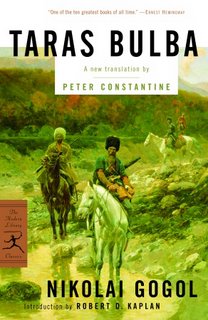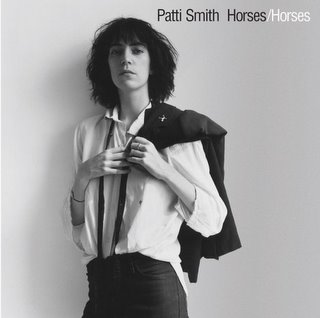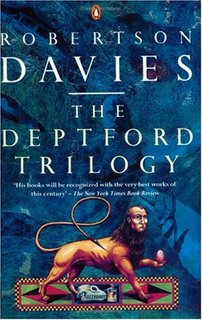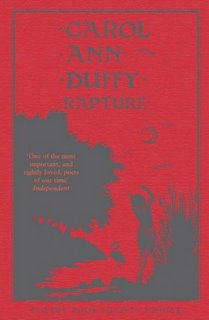"I'm not attracted to guys with beards. Maybe that's why Jesus bores me. Maybe if he shaved I'd dig him."
~ Patti Smith, GQ, Dec 2005 Issue
“Ever tried. Ever failed. No matter. Try Again. Fail again. Fail better.” ~ Worstward Ho, Samuel Beckett
~ Carrie Brownstein
"I'm not attracted to guys with beards. Maybe that's why Jesus bores me. Maybe if he shaved I'd dig him."
 Taras Bulba by Nikolai Gogol, translated by Peter Constantine.
Taras Bulba by Nikolai Gogol, translated by Peter Constantine. "I was always in competition with the other big-name columnists -- who would shamelessly rob from me. You know, it's like I would be in Salon on Thursday, and something from it would show up in Maureen Dowd's weekend column, and so on. But I had to make sure that when people went to it that it didn't just seem to be a rehash of someone else's column."
"I, Badra bent Salah ben Hassan el-Fergani, born in Imchouk under the sign of Scorpio, shoe size thirty-eight, and soon to reach my fiftieth year, make the following declaration: I don’t give a damn that Black women have delectable cunts and offer total obedience; that Babylonian women are the most desirable and women from Damascus the most tender to men; that Arab and Persian women are the most fertile and faithful; that Nubian women have the roundest buttocks, the softest skin, and passion that burns like a tongue of fire; that Turkish women have the coldest wombs, the most cantankerous temperament, the most rancorous heart, and the most radiant acumen; and that Egyptian women are soft-spoken, offer kind-hearted friendship, and are fickle in their constancy."

The first time I saw Robert he was sleeping. I stood over him, this boy of twenty, who sensing my presence opened his eyes and smiled. With few words he became my friend, my compeer, my beloved adventure.
When he became ill I wept and could not stop weeping. He scolded me for that, not with words but with a simple look of reproach, and I ceased.
When I saw him last we sat in silence and he rested his head on my shoulder. I watched the light changing over his hands, over his work, and over the whole of our lives. Later, returning to his bed, we said goodbye. But as I was leaving something stopped me and I went back to his room. He was sleeping. I stood over him, a dying man, who sensing my presence opened his eyes and smiled.
When he passed away I could not weep so I wrote. Then I took the pages and set them away. Here are those pages, my farewell to my friend, my adventure, my unfettered joy.
Jesus died for somebody's sins
But not mine
Meltin’ in a pot of thieves
Wild card up my sleeve
Thick heart of stone
My sins my own
They belong to me. Me

Clenched Soul
We have lost even this twilight.
No one saw us this evening hand in hand
while the blue night dropped on the world.
I have seen from my window
the fiesta of sunset in the distant mountain tops.
Sometimes a piece of sun
burned like a coin in my hand.
I remembered you with my soul clenched
in that sadness of mine that you know.
Where were you then?
Who else was there?
Saying what?
Why will the whole of love come on me suddenly
when I am sad and feel you are far away?
The book fell that always closed at twilight
and my blue sweater rolled like a hurt dog at my feet.
Always, always you recede through the evenings
toward the twilight erasing statues.
But I'm not sure the Jesus imagery in "Narnia" is any more overt than what you get in "E.T." (he does, after all, have the power to heal and to rise from the dead).It warranted a raised eyebrow. ;)
'When friends die, one's own credentials change: one becomes a survivor. Graham Greene has already had biographers, one of whom has served him mightily. Yet I hope that there is room for the remembrance of a friend who knew him - not wisely, perhaps, but fairly well - on an island that was "not his kind of place," but where he came season after season, year after year & where he, too, will be subsumed into the capacious story.'I love Graham Greene's writing. Will write more on him when I get around to The Quiet American.
Eliza Naumann, a seemingly unremarkable eleven-year-old, expects never to fit into her gifted family: her father, Saul, absorbed in his study of mysticism; her brother, Aaron, the vessel of his father's spiritual ambitions; and her brilliant but distant lawyer mother, Miriam. But when Eliza discovers an aptitude for competitive spelling, Saul takes it as a sign that she is destined for greatness. In this altered reality, Saul ushers her into his hallowed study and lavishes upon her the attention previously reserved for Aaron, who in his displacement embarks on a lone quest for spiritual fulfilment that leads him to the Hare Krishna. And when the unveiling of Miriam's secret life triggers an almighty explosion, it is Eliza who must order the chaos.
Ms. Gong's hauteur and soaring cheekbones work better for her character, a woman of acid resolve. Although there are moments when Hatsumomo comes perilously close to Dragon Lady caricature ("I will destroy you!"), the actress's talent and dignity keep the performance from sliding into full-blown camp. But even the formidable Ms. Gong cannot surmount the ruinous decision to have her and Ms. Zhang, along with the poorly used Mr. Yakusho, deliver their lines in vaguely British-sounding English that imparts an unnatural halting quality to much of their dialogue. The. Result. Is. That. Each. Word. Of. Dialogue. Sounds. As. If. It. Were. Punctuated. By. A. Full. Stop. Which. Robs. The. Language. Of. Its. Watery. Flow. And. Breath. Of. Real. Life. Even. As. It. Also. Gives. New. Meaning. To. The. Definition. Of. The. Period. Movie.
"Memoirs of a Geisha" is rated PG-13 (Parents strongly cautioned). The film is as discreet as an unopened waterlily.
Chinese actresses play Japanese geisha (in a period concurrent with the Sino-Japanese war) and speak English the way Hollywood has always imagined Asians do, all stilted syntax and awkward enunciations ("You are! To become! Geisha!").I laughed when I read it. So typical.
"Keepers of notebooks are a different breed altogether, lonely and resistant rearrangers of things, anxious malcontents, children afflicted apparently at birth with a sense of loss."~ Joan Didion
Obviously if you know me, you would already know about some of my affectations. One of them being my "thing" with fountain pens.
Recently I've acquired a new affectation: Moleskine Notebooks (pronounced mol-a-skeen-a). For the uninitiated, here's a a link to Wikipedia on Moleskine.
Moleskine is produced by an Italian stationary company Modo&Modo. They hardsell the moleskine as "the legendary notebook of Hemingway, Picasso, Chatwin."
Now, I'm not sure about Hemingway or Picasso, but I first learnt about Chatwin's compulsion for moleskine from The Songlines:
For lunch we had beer and a salami sandwich. The beer made me sleepy, so I slept until four. When I woke, I started rearranging the caravan as a place to work in. There was a plyboard top which pulled out over the second bunk to make a desk. There was even a swiveling office chair. I put my pencils in a tumbler and my Swiss Army knife beside them. I unpacked some exercise pads and, with the obsessive neatness that goes with the beginning of a project, I made three neat stacks of my 'Paris' notebooks. In France, these notebooks are known as carnets moleskines: 'moleskine', in this case, being its black oilcloth binding. Each time I went to Paris, I would buy a fresh supply from a papeterie in the Rue de l'Ancienne Comédie. The pages were squared and the end-papers held in place with an elastic band. I had numbered them in series. I wrote my name and address on the front page, offering a reward to the finder.
Some details on the product:
The Moleskine Notebooks have a cardboard bound cover with rounded corners and an elastic closure. An expandable inner pocket made of cardboard and cloth contains the Moleskine history. The acid free paper pages are thread bound.
Pocket size: 9 x 14 cm (3½ x 5½").
Large size: 13 x 21 cm (5 x 8¼").
I avoid ruled notebooks, preferring squared or plain pages for my scribbling.
[Squared Moleskine Notebook]
[Plain Moleskine Notebook]
I like the freshness of new notebooks. The paper is crisp, clean and you almost can't bear to sully the surface. Problem is - a notebook isn't much use if we don't write in it. So I usually break in my notebooks with a quote or something transferred from an older notebook - a sense of continuity in the chronicle perhaps.
I broke in my first moleskine (purchased 1st December 2005) by hand-copying T. S. Eliot's Four Quartets unto the pages. By slowly and meticulously writing out the poem we're forcing ourselves to re-read them in a more deliberate manner. And goodness knows T. S. Eliot needs to be re-read until he starts to make sense.
RELATED LINKS:
Moleskine - the English site by the makers of the Moleskine
BBC h2g2 on Moleskine - it's a lifestyle choice, moleskine! ;p
Moleskinerie - a network for moleskine fans around the globe
 Wrapped up Virginia Woolf's "A Room of One's Own" last week and started on Robertson Davies' "The Deptford Trilogy."
Wrapped up Virginia Woolf's "A Room of One's Own" last week and started on Robertson Davies' "The Deptford Trilogy."
We live in a period of declining stars. Few celebrities these days (aside from the smoldering Angelina Jolie) seem to have complex psychic lives.
~ Camille Paglia
"She was night-time and words were the dream."
~ From Art Objects, on Virginia Woolf